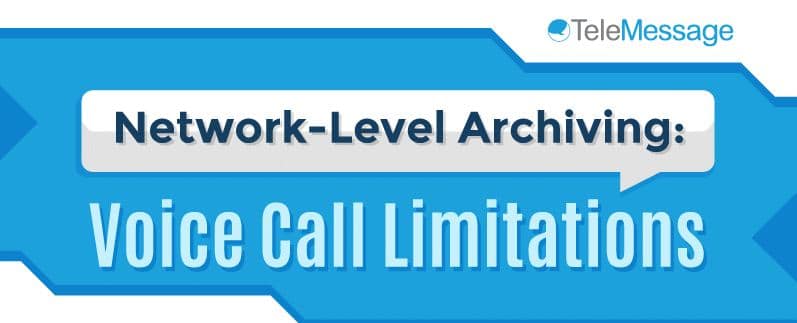The increasingly stringent government and industry regulations for the capture and archive of text messages and voice calls have pressured most financial firms to explore different – one of such is mobile archiving through the mobile network.
Network-level capture of text messages and voice calls is considered by many financial organizations – especially by companies that issue Apple devices to their employees – as the preferred native option for mobile archiving. The reason for this is that it can be activated without involvement or knowledge of the phone owner. It can also be activated for any type of phone. Including legacy and non-smartphone. It runs independently of the mobile device and platform, and it does not require a third party application to be installed on the mobile device.
But like other mobile archiving methods, network-level archiving has its own caveats that financial firms and those in charge of compliance and risk management should be aware of. In this blog and infographic, we will detail some of the key technical as well as mobile carrier-induced limitations of network-level archiving which would help you decide if this is the right solution for your organization or not.

1. Most carriers don’t have Network level text and voice capture capabilities
Due to the network infrastructure, technical complexity and investment required to enable mobile communication capture, most mobile carriers simply don’t have this capability in their network. This means that in the USA, only two out of the 5 largest mobile would even have this functionality in their network.
In other countries, it’s even worse, and in most countries, there isn’t a single carrier in the county which can offer it.
Even carriers that do have recording capabilities in the network, will usually have these limited. In many cases these are limited to capture only the text messages, in some carriers only SMS but not MMS messages, and no voice call capture capabilities. While other carriers can capture only the voice calls but not the text messages. Most of these carriers won’t by able to capture other popular messaging such as .
And most of these carriers won’t allow you to store these messages in your corporate archive in a way ready for eDiscovery.
This is why many of them chose to work with archiving partners (like ) to overcome some of these inherited limitations in their network archiving.
2. Carriers Will Record Calls and Text Only For Corporate-Owned Devices
Unfortunately for companies that have BYOD (Bring Your Own Device) policy, network-level archiving is not an option since most mobile carriers will only capture text and voice calls on corporate-owned devices because of privacy and legal considerations. Besides, if your workplace with a BYOD program, they might be on different mobile networks, some of which might not have the ability to capture and record mobile communication.
3. Roaming and Global Geographic Limitations of Network Recording
To resolve the global in-network recording for companies that have a workforce which travels and commutes r overseas on business travels,Carriers take advantage of Customized Applications for Mobile Enhanced Logic (CAMEL), an application which extends the carrier’s GSM services and capabilities and allows the users to use these services and capabilities while abroad.
Since not all mobile carriers around the world support or have CAMEL application embedded in there GSM services, their might be countries or roaming carriers where a roaming employee will not be able to make calls or send a text messages through a foreign mobile carrier that does not have CAMEL network feature, or if allowed, such call or text messages will not be captured and recorded.
4. Some Voice Calls Can’t Be Captured And Recorded
Another limitation of network-level archiving is that most carriers do not have the capability to capture certain voice calls or elements of it, such as forwarded calls, calls made by prepaid users, push-to-talk conversations, WiFi or data calling. Others have limitation with recording calls to special numbers such as 911, operator calls and rerouted calls, as well as answer and ringback tones.
This means that when a financial adviser uses iMessage to communicate, does calls over data, or uses services such as the push-to-talk feature of the mobile phone to discuss trade information with a colleague or clients, the mobile carrier might not be able to capture nor archive that conversation, and thus advises blocking of all mobile and device services which can’t be captured and archived.
5. Annoyance in the voice recording:
Some mobile carriers have implemented the Voice recording by routing all incoming and outgoing calls via a gateway which does the call recording.
In some networks, this routing is implemented in a why which adds call connection delay or as an additional announcement which might annoy users or require their consent and approval. In some cases, such configurations are driven by the mobile network limitation and cannot be fixed or changed by the mobile carrier (although some carriers which have such limitations have assured us that they are committed to fix and resolve this in a future upgrade).
cards if the employees use their personal devices and are subscribed to a different mobile carrier.
6. Reliable and Complete Delivery of Recorded Content is Not Guaranteed
The last but perhaps the most significant limitation of network-level archiving is that many mobile carriers would not agree to provide a reasonable Service Level Agreement (SLA)with regards to the actual delivery and quality of captured text message or voice call.
For instance, some mobile carriers clearly state that they do not guarantee a complete and accurate recording of mobile conversations in various situations, and would not commit to any SLA nor have any flexibility in their legal and user policy coverage.
While these disadvantages might be resolved with advancements in network technology over time, having solid archiving policies and systems to mitigate or reduce the compliance risks that these limitations may cause can significantly help financial organizations continue to take advantage of this method.
TeleMessage’s Network Archiver is a network-level text message and voice call recording solution that enables organizations to capture mobile messages from carrier network Or use other to capture text, chats and voice calls. To learn more about its features and capabilities, visit our website today at www.telemessage.com





